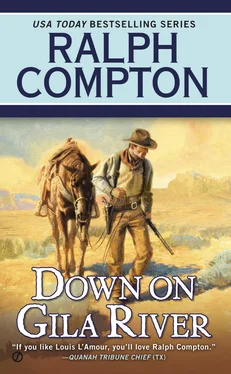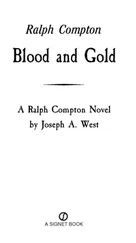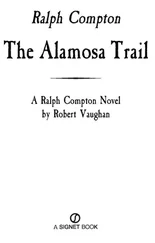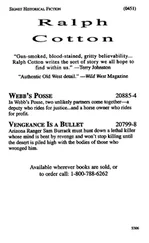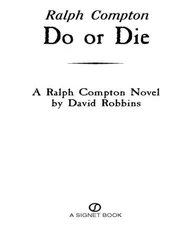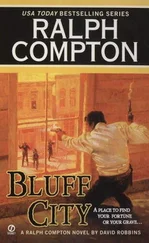* * *
Jake Wells favored Jeptha more than he did his brother Dan.
Where Dan Wells was a blade of steel, tempered to tough slenderness, Jake was huge, with a shaggy mane of red hair and a beard that spread over his buckskinned chest to the buckle of his gun belt.
He was twice as big as Dan, but only half as smart.
During his career as an outlaw, Dan Wells had killed three white men, Jake seven—only one of them in a fair fight.
As he watched the last shovelful of dirt thrown on Jeptha’s grave, Jake played “In the Sweet By and By” on his harmonica.
Dan Wells, much affected, threw back his head and, his eyes streaming tears, joined the harmonica in song.
In the sweet by and by,
We shall meet on that beautiful shore;
In the sweet by and by,
We shall meet on that beautiful shore.
The harmonica wailed to an end and Jake threw himself on the grave, sobbing. He was crazed with grief and filled with the hunger to strike out and maim and kill.
At that moment he was the most dangerous man on earth.
Chapter 18
Sam Sawyer followed the river trail west along the bank of the Gila, then looped to the south as the massive bulk of Watson Mountain blocked his path.
He had lost blood and felt as weak as a day-old kitten, and the pain of his wounded ribs gave him no peace. Sweat beaded his forehead, and shimmering heat waves banked around him, adding to his misery.
Under a pitiless sun, riding through the thin air, Sam looped west again into the Canyon Hills at the foot of the Pinos Altos Range. He desperately needed a place to hole up and treat his wound.
Sam drew rein and looked around him. He saw little but mountain peaks and the green swath of high timber under the hazy bowl of the sky.
Born of the Mogollon Mountains to the northwest, a sudden wind took Sam by surprise. Around him mesquite and juniper clicked their branches, and higher on the Pinos Altos slopes aspen trembled, to the amused rustle of the swaying pines.
The wind grew in intensity, and Sam felt the sting of desert sand on his face. Shredded leaves and pine needles cartwheeled around him, and the sorrel grew restive and tossed its head, jangling the bit.
The horse had begun its career as a cow pony, and from the dim shadows of its memory came the recollection that this was stampede weather, and dangerous.
Roaring now, the wind pummeled Sam as he swung out of the saddle and led the sorrel toward what he hoped was the mouth of a narrow arroyo. He had no confidence in his sight, and he might well be heading straight for a U-shaped slab of dark rock.
A loud crack! cut through the deeper bellow of the storm as the wind snapped a ponderosa pine. The tree toppled over and bled sap from a splintered stump.
Spooked, the sorrel reared, frightened arcs of white in its eyes.
“Easy, boy, easy,” Sam said, holding on to the reins for grim life.
But weakened as he was by loss of blood, the reins wrenched out of his hands as the big sorrel reared again, this time twisting its head away.
The horse turned, felt the wind under its tail, and bolted. It skirted the foothills, and Sam quickly lost sight of the animal as it galloped south.
Cussing under his breath, he made for what he believed was the arroyo.
To his unbounded joy, it was.
* * *
The rocky gully was narrow, not much wider than a slot canyon, and it was choked with brush and cactus. Sam had trouble making his way deeper as he searched for a place out of the wind where he could sit and rest.
Mesquite and juniper grew on top of sheer rock walls that were about ten feet high. Above Sam’s head the trees rustled and creaked, hammered by gusts that shrieked like banshees.
After about twenty yards, the arroyo opened up into a small amphitheater enclosed by tall spikes of raw white rock. Here there was grass, but no sign of water.
Sam found a spot in the lee of the wind, sat down, and gratefully fetched his back against the warm rock. He reached for the makings, remembered that he no matches, and felt the bitter disappointment that only a smoking man knows.
Steeling himself for the worst, he slipped his canvas suspenders off his shoulders and opened his shirt. Shifting his body around, he craned his head to inspect his wound.
It didn’t look good. In fact, it seemed real bad.
His entire left side was thick with dried blood, and when he touched his ribs the pain took his breath away and made him wince.
“Blast it, Sam,” he said. “I reckon you’re shot through and through like you thought.”
He had no water to bathe the wound and figured it wouldn’t help anyway. Maybe he was done for. Maybe he was breathing his last, and him without a smoke.
Sadder still, his shirt was ruined, and he bitterly regretted the forty-five cents he’d paid for it in El Paso just a couple of years before.
It had been a real nice shirt.
* * *
A ravening wind is the wild, bastard child of a high-country thunderstorm, and Sam heard distant rumbles as the sky turned to molten lead.
There was no shelter in the clearing and he knew to steer clear of the few stunted trees that grew here and there. Up in the Spur Lake country he’d once seen a horse and rider killed by lightning after they took shelter under a wild oak, and the memory lived with him.
Sam drew up his knees and bent his head, waiting for what was to come. Good or bad, he no longer cared.
Lightning scrawled across the sky like the signature of a demented pagan god.
Then came thunder.
Then came the rain.
The downpour battered Sam’s shoulders and rattled on his hat like a kettledrum. The clearing seared white in the lightning flashes, and the rain-running rock shimmered like wet steel. Thunder slammed into the arroyo, echoing like a cannonade, and he heard another pine groan, then break.
Sam wrapped his arms around his chest, trying to make himself small, miserable in his loneliness.
Hunched against the storm as Sam was, the rider took him by surprise.
Chapter 19
A boom of thunder that rattled the door of the dugout wakened Hannah Stewart from uneasy sleep.
Rain hissed around her like a baby dragon under a rock, and lightning flared though the inch-wide gap between the door and jamb.
She rose from a pile of sacking, stepped to the door, pressed her face to a gap, and looked outside. As far as she could tell, her view confined to a narrow slit, the only thing moving out there was the rain.
There was no sign of Vic Moseley or the Wells brothers.
Earlier—had it been an hour ago or a day?—she’d heard shooting, and much later the sound of horses moving out. Did that mean Moseley and the others were gone, at least for a while?
Hannah had no answer to that question, but it didn’t really matter. Lori was still held captive, either in the saloon or the women’s quarters, and she had to find her.
The heavy door presented a problem, since she didn’t have the strength to force it open.
Waiting for lightning flashes to illuminate her way, she searched around the dugout. She found nothing but a rusty steel eating fork and some coiled rope.
The fork she could use.
The outside bolt was a heavy piece of timber that slotted into a U-shaped iron bracket. About an inch of the bolt showed between the ill-fitting door and the jamb.
Hannah slipped the head of the fork into the space. She jabbed the prongs into the timber and tried to use them to ease back the bolt.
It didn’t work. The tines were too blunt and fragile to penetrate the tough pine.
She tried again, with the same result—the bolt refused to budge.
Frowning, Hannah thumbed the prongs. Then she stepped to the rear wall of the dugout. Her face set in concentration, she began to scrape the steel handle of the fork against the rock.
Читать дальше
